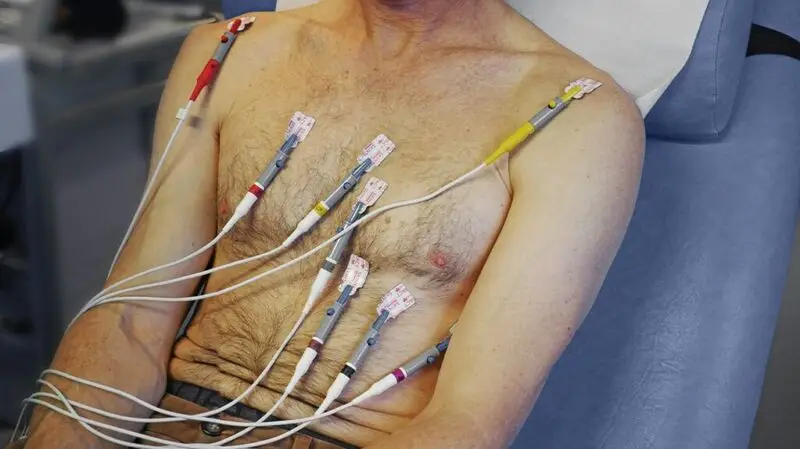
- Researchers have known for some time now that cardiovascular health can impact a person’s risk for dementia.
- Past studies show that certain heart-related conditions may increase a person’s risk of developing dementia.
- A new study found that people with signs of heart damage during middle age — detected through a specific protein — are at a higher risk of developing dementia later in life.
Researchers have known for some time now that
For example, past studies show that certain heart-related conditions, like high blood pressure,
Now, a new study recently published in the European Heart Journal adds to what we know about the link between heart health and dementia risk by reporting that people with signs of heart damage during middle age — detected through a specific protein — are at a higher risk of developing dementia later in life.
For this study, researchers analyzed health data from approximately 6,000 participants in the Whitehall II study, which began in 1985 and has been following study participants for over 35 years.
All study participants were between the ages of 45 and 69 when they were given a test to measure the amount of cardiac troponin I in their blood. Troponin is a type of protein found in heart muscle cells that is released into the bloodstream when the heart experiences any sort of damage. This allows the protein to be used as a biomarker for detecting a heart attack, myocarditis, pericarditis, or other heart muscle issues.
None of the study participants had a diagnosis of dementia or cardiovascular disease when they had their first blood test to detect levels of troponin. Participants were followed for a median of 25 years, completing various tests along the way.
At the study’s conclusion, researchers found that participants who had developed dementia had consistently higher levels of troponin in their blood, and those with the highest troponin levels increased their dementia risk by 38% compared to participants with the lowest troponin levels.
Additionally, scientists discovered that study participants with high levels of troponin between the ages of 45 and 69 experienced a quicker decline in their memory, thinking, and problem-solving abilities. These participants also tended to have a smaller hippocampus and lower
“Poor heart health in middle age puts people at increased risk of dementia in later life,” Eric Brunner, PhD, professor of social and biological epidemiology in the Institute of Epidemiology and Health Care at University College London, and senior author of this study, says in a press release.
“Damage to the brain seen in people with dementia accumulates slowly over the decades before symptoms develop. Control of risk factors common to both heart disease, stroke, and dementia in middle age, such as high blood pressure, may slow or even stop the development of dementia as well as cardiovascular disease. We now need to carry out studies to investigate how well troponin levels in the blood can predict future dementia risk. Our early results suggest that troponin could become an important component of a risk score to predict future probability of dementia.”
— Eric Brunner, PhD
Medical News Today spoke with Cheng-Han Chen, MD, a board certified interventional cardiologist and medical director of the Structural Heart Program at MemorialCare Saddleback Medical Center in Laguna Hills, CA, about this study.
“This study found that people with higher levels of cardiac troponin — a marker of possible heart damage — in the blood were more likely to develop dementia many years in the future. While the exact nature of the cause-and-effect is not entirely clear, the findings illustrate the close relationship between heart health and brain health and suggest that the same risk factors may underlie both problems.”
— Cheng-Han Chen, MD
“Cardiovascular disease and cerebrovascular disease are two of the most serious medical problems that our society faces,” Chen continued. “Understanding the possible connections between these conditions can potentially help us better treat — and possibly prevent — these conditions. Future research can examine possible mechanisms by which elevated troponin levels lead to future dementia.”
MNT also spoke with Shadi Yaghi, MD, FAHA, chair of neurology at Hackensack Meridian Neuroscience Institute at Jersey Shore University Medical Center in New Jersey, about this research, who commented that this is a terrific study highlighting a strong link between cardiovascular Health and brain Health.
“Damage to the heart can, in turn, cause damage to the brain, and the factors that cause damage to the heart, such as high blood pressure, high cholesterol, diabetes, unhealthy diet patterns, and lack of physical activity, also cause damage to the brain. It is important to better understand the link between the two to try to prevent heart damage to optimize brain health and lower the chances of dementia.”
— Shadi Yaghi, MD, FAHA
When asked what he would like to see as the next steps for this research, Yaghi commented he would like to see “whether specific treatments that preserve cardiovascular health can help lower risk of dementia.”





